Aleister Crowley…Chess Master?!
by Robert T. Tuohey
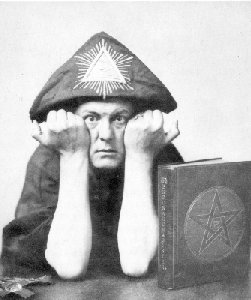
Imagine facing this guy…OTB!
Let’s get one thing straight: Aleister Crowley has been called a lot of things by a lot of people. Infamously, the scandal sheets of his day branded him “the wickedest man in the world”. The English novelist W. Somerset Maugham, in “A Fragment of Autobiography”1, called Crowley “…a fake, but not entirely a fake”. In a similar memoir, “A Moveable Feast”, Ernest Hemingway, tongue-in-cheek and pernod-in-hand, tagged Crowley “the Devil’s Disciple”2. And yet, many have found the man inspirational, for example Jimmy Page, the Beatles, and Ozzie. Indeed, to thousands worldwide, the Great Beast 666 (as Crowley is known to his followers), is the prophet of the New Aeon religion Thelema3.
Finally, usually somewhere near the bottom of the page, after a long and varied list of attributes (e.g., world traveler, mountain climber, poet, prophet, artist, womanizer, drug user, occultist, and so on), they also toss in that he was a chess expert.
So, what have we got here? Well, by all accounts, soul-deep in the magick, or occult, or black (choose your shading) arts, a prolific writer (I guesstimate in excess of twenty volumes of work), the founder of a new religion, and one hell of a wild and crazy guy. And, oh yeah, he could allegedly play a mean game of chess, too.
Alright, let’s cut to the endgame: Who in the Devil’s name was Aleister Crowley? And could this guy really push some wood or not?
Born Edward Alexander Crowley October 12, 18754, in Leamington, Warwickshire, England, his wealthy parents were devout members of the strict, fundamentalist Christian sect the Plymouth Brethren (oddly, the family fortune was derived from an ale brewing business, and yet their religion demanded strict teetotalism). Certainly, Crowley’s childhood cannot be termed an unhappy one, and yet an atmosphere of such uncompromising religiosity on so boisterous a young spirit tends for a bad mix.
The child showed a certain giftedness, as recorded here by Crowley himself (using the third person), in his “Confessions”5.
The boy’s intellect was amazingly precocious. It must have been very shortly after the move to Redhill that a tailor named Hemming came from London to make new clothes for his father. Being a "brother", he was a guest in the house. He offered to teach Alick chess and succeeded only too well, for he lost every game after the first. The boy recalls the method perfectly. It was to catch a developed bishop by attacking it with pawns. (He actually invented the Tarrasch Trap in the Ruy Lopez before he ever read a book on chess.) This wrung from his bewildered teacher the exclamation, "Very judicious with his pawns is your son, Mrs. Crowley!"
As a matter of fact, there must have been more than this in it. Alick had assuredly a special aptitude for the game; for he never met his master till one fatal day in 1895, when W. V. Naish, the President of the C. U. Ch. C., took the "fresher" who had beaten him to Peterhouse, the abode of Mr. H. E. Atkins, since seven times amateur champion of England and still a formidable figure in the Masters' Tournament.
It may here be noted that the injudicious youth tried to trap Atkins with a new move invented by himself. It consists of playing K R B Sq, instead of Castles, in the Muzio Gambit, the idea being to allow White to play P Q 4 in reply to Q B 3.
At about the age of 18, as befitting a young gentleman of means, Crowley “went up to Cambridge”. By now, however, his true personality was beginning to assert itself, and he seems to have squandered precious little time on coursework, instead occupying himself with writing poetry (selections of his work would later be included in the Oxford Book of Mystical Verse and the anthology Cambridge Poets 1900-1913), mountain climbing, and, of course, chess (he soon became president of the university club).
Regarding his chessic activities at university, again dipping into the Confessions6, we glean the following:
At Eastbourne, I had still no interest in games. I was still prevented from anything like intimate association with my fellow creatures. I was still ignorant of the existence of English literature and I became a first-rate French scholar without reading any French literature. In my play time I was either hunting flappers on the front, playing chess or climbing Beachy Head. My chess was almost entirely book learning and I was very mush surprised to find myself the best player in the town. For although the local champion insisted on giving me pawn and more, I beat him so easily every time I met him that the odds might have been reversed without making much difference to the result. I edited a chess column in the Eastbourne Gazette and made myself a host of enemies by criticizing the team. I wanted to arouse enthusiasm, to insist on study and practice and to make Eastbourne the strongest town in England. The result fell short of breaking up the club, but not very far.
I used my position a editor to criticize the formation of the team and anything else that seemed to me wrong. I was absolutely unable to conceive that anyone should be anything but grateful for constructive criticism. I had moreover in my mind a firm conception of an editor as Jupiter tonans. I remember one occasion on which I made myself particularly nasty. In a club tournament I had won all my games except two against a man named Martin, who had failed to play any of his games. At the same time he would not withdraw from the tournament. I tried to deal with the situation in my weekly articles. I requested Mr. Martin to begin to play his games; I implored him to begin to play his games; I pointed out to him the propriety of beginning to play his games, I showed him that the best traditions of England (which had made her what she was) spoke with no uncertain voice to the effect that he should begin to play his games. All this settled down to a weekly chorus á la Cato, Delenda est Carthago. Whatever the subject of my discourse, it invariably ended, "Mr. Martin has not yet begun to play his games."
By this persistent nagging I got him to make an appointment with me and the game had to be adjourned in a position which was clearly won for me. He determined to avoid defeat by the simple process of refusing to make any further moves. I could have done a great deal with a brazier and a gimlet, but short of that there was no moving him; and his abstention prevented me from being proclaimed the winner. I published an analysis of the position, demonstrating that he was bound to lose and suggesting that he should either play it out or resign. But of course the result of my manoeuvres had simply been to drive him into blind fury and the situation was never settled. It simply lapsed by my departure for Switzerland.7
And, more interestingly8:
I was to find very shortly that the most innocent personal relations could be taken by filthy minds as the basis for their malicious imagination. The story of how this came about dominates my third year at the university, as will appear. It seems as if my destiny were preparing me for my appointed work by clearing inessential factors out of the way. My one serious worldly ambition had been to become the champion of the world at chess. I had snatched a game from Blackburne in simultaneous play some years before. I was being beaten in the Sicilian defence. The only chance was the sacrifice of a rook. I remember the grand old master coming round to my board and cocking his alcoholized eye cunningly at me. "Hullo," said he, "Morphy come to town again!" I am not coxcomb enough to think that he could not have won the game, even after my brilliancy. I believe that his colossal generosity let me win to encourage a promising youngster.
I had frequently beaten Bird at Simpson’s and when I got to Cambridge I made a savagely intense study of the game. In my second year I was president of the university and had beaten such first-rate amateurs as Gunston and Coles. Outside the master class, Atkins was my only acknowledge superior. I made mincemeat of the man who was champion of Scotland a few years later, even after I had given up the game. I spent over two hours a day in study and more than that in practice. I was assured on all hands that another year would see me a master myself.
I had been to St. Petersburg to learn Russian for the Diplomatic Service in the long vacation of 1897, and on my way back broke the journey in Berlin to attend the Chess Congress. But I had hardly entered the room where the masters were playing when I was seized with what may justly be described as a mystical experience. I seemed to be looking on at the tournament from outside myself. I saw the masters — one, shabby, snuffy and blear-eyed; another, in badly fitting would-be respectable shoddy; a third, a mere parody of humanity, and so on for the rest. These were the people to whose ranks I was seeking admission. "There, but for the grace of God, goes Aleister Crowley," I exclaimed to myself with disgust, and there and then I registered a vow never to play another serious game of chess. I perceived with praeternatural lucidity that I had not alighted on this planet with the object of playing chess.
As we shall see, a pitiful few of Crowley’s games have been preserved. Among these, however, a win against a Coles, of the university team, survives, as well as a draw, but not a win, against the great Blackburne.
Several years later, in 1904, in Cairo, Egypt, with his first wife, Crowley would experience the event of his life – achieving communication with his Holy Guardian Angel, Aiwass. From this encounter would result the Liber Al vel Legis (or The Book of the Law). Shortly thereafter, Crowley would found the religion of Thelema (Greek for “Will”), with The Book of the Law serving as the central text.
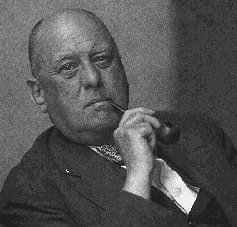
The Great Beast 666 contemplates his next move…
I will not do Crowley the injustice of attempting to thumbnail the rest of his colorful life (as he says himself, it’s more like the lives of three people!). Suffice it to say, what with world travels, mountain climbing (including one of the first K-2 face attempts), prodigious writings, founding magical organizations (most notably the disastrous Abbey in Cefalu, Italy), two marriages and countless women (and even a few boys) in between, Aleister Crowley was indeed a “man of many parts”.
Crowley’s last years were spent in the small English town of Hastings (certainly not unknown to chess players); for some years he had been plagued by financial worries caused by the various scandals that swirled around him. As no publisher was willing to take him on (fearing government prosecution on some type of “public morals” charge), and his personal resources has long since run out, he only managed to survive via “hook and crook”. Never one to succumb to misfortunes, however, Crowley continued to write during these hard, uncertain years, producing, amongst other titles, his “Book Of Thoth” (a very significant contribution to the theory of the Tarot cards).
In the evenings, however, the elderly, though ever-bon-vivant, Crowley, strapped as he was for any ready cash, complained a bit of being bored: he said he wished he had a lady friend to occupy some of his time, or that at least there was a chess player around who could give him a decent game.
Aleister Crowley died December 1, 1947.
As mentioned, a very few of Crowley’s games have been preserved (although the number of fake Crowley games is astounding)9. In fact, to my knowledge, four definite examples, with another five or six possible games, constitute the corpus (there also exist 14 chess problems in the “Chess Notes”, see below, all or some of which are of Crowley’s composition). All of the definite games were played when he was at Cambridge.
With this limited evidence, all we can truly venture is that Crowley was at least a strong amateur player; in all likelihood, with the experience of years, he attained master-level strength. Certainly, the man’s insight into the psychology of chess was deep. Ponder these lines from one of Crowley’s short stories, written when he was about forty10:
“Let me tell you something, if you will forgive a senior for prosing. There are two ways to play chess. One is a man against a man; the other is a man against a chessboard. It’s the difference between match and metal play in golf. Observe: if I know you are going to play the Philidor defense to the King’s Knight Opening, I do not risk being forced into the Petroff, which I dislike. But in playing an unknown quantity, I must analyze every position like a problem, and guard against all possibilities. It takes a great genius and a lifetime’s devotion to play the latter game. But so long as I can read your motive in your move, I can content myself with guarding that one line. Should you make a move whose object I cannot see, I am compelled to take a fresh view of the board and analyze the position as if I were called upon to adjudicate an unfinished game.”
The first game analyzed below is from an inter-collegiate match; Crowley clearly outplays his opponent, demonstrating a sound grasp of fundamental chess principles (with, however, something of a slip on his 32nd move). The second game is from a six or seven board simul the famous English master Joseph Blackburne gave at the Cambridge club; Crowley ventures an unsound pawn sac which, incredibly, Blackburne miscalculates, leading to a draw.
Along with my own analysis, I have incorporated Crowley’s own comments from his “Chess Notes”.
Coles - Crowley,A [B21]
Hailsham-EastBourne Match, 1894
1.e4 c5 2.d4
B21 Sicilian: Smith-Morra gambit.
2...cxd4 3.Qxd4 Nc6 4.Qd1 Nf6 5.Bc4?
OOB 5.Nc3 e6 6.Nf3 Bb4 7.Bd2= Is one book continuation.
5...Qa5+ 6.c3?
Crowley: Bd2 is much better, gaining time and saving the attacked pawn.
6...Nxe4 7.Qf3 Nf6 8.Qf4?! e5 9.Qd2 Ne4
"Tactics flow from a superior position".
10.Qd5 Qxd5 11.Bxd5 Nf6 12.Bb3
Black is clearly in control.
12...d5 13.h3?! Bc5 14.Ne2 0-0 15.0-0 Be6 16.Nd2 Rad8
Classic center domination.
17.a3 d4 18.Bxe6 fxe6 19.Nb3 Bb6 20.Bg5 h6 21.Bxf6 Rxf6 22.Rad1 d3 23.Ng3 Rf4 24.Nd2 Ne7 25.Nf3?
Just hastens the inevitable. 25.Nge4
25...e4 26.Nd2 e3 27.fxe3 Bxe3+ 28.Kh2 Bxd2 29.Rxd2 Rxf1 30.Nxf1 e5 31.Ng3 Kf7 32.Ne4 Ke6?
Black's edge is lost with this inaccuracy. 32...Nf5
33.Nc5+ Kf5
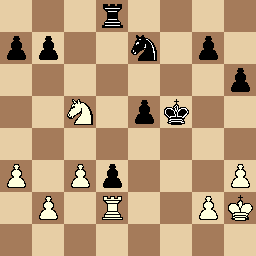
34.Rxd3
Crowley: "Anything but this. Nxd3 or Nxb7 would change the fate of the day most likely." 34.g4+! Kf6 35.Rxd3; 34.Nxd3=; 34.Nxb7?-+ The pawns will soon be connected, and damned hard to deal with.
34...Rxd3 35.Nxd3 e4 36.Ne1 Nd5 37.g3 Ne3 38.Kg1? Nc4 39.Kf2 Nxb2 40.Ke2 Nc4 41.Nc2 g5 42.Ne3+?
White's last blunder.
42...Nxe3 43.Kxe3 h5 44.c4
Crowley: Fatal of course. But nothing would save the game.
44...Ke5 45.a4 b6 46.g4 hxg4 47.hxg4 a6
And the black pawns are unstoppable. 0-1
Blackburne,J - Crowley,A [B45]
Blackburne simul Eastbourne, 1894
1.e4 c5 2.Nf3 Nc6 3.d4 cxd4 4.Nxd4 e6 5.Nc3 B45
Sicilian: Taimanov variation ~ as we now call it. Crowley: "The usual move is Nb5, but Mr. Blackburne perfers development to attack." 5.Nb5 B44 Sicilian: Szen (anti-Taimanov) variation ~ as we would say.
5...Bb4?
Crowley: "Unwise." ....Because the trade is forced.
6.Nxc6 bxc6 7.Qd4
OOB 7.Bd3 d5 Book.
7...Bxc3+ 8.bxc3 Nf6 9.Ba3 Qa5!
Crowley: "A strong counterattack." 9...d5
10.Bb4 + =
10...c5?
The sac is unsound. 10...Qb6 += At least holds, and is probably best.
11.Bxc5 Nxe4
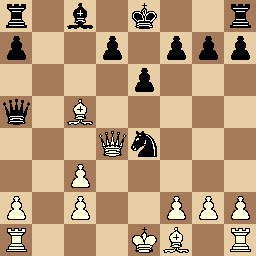
12.Bb4
12.Qxg7! Wins. It's hard to see how Blackburne missed this. 12...Qxc5 (12...Qxc3+ 13.Qxc3 Nxc3 14.Bd4 + -) 13.Qxh8+ Ke7 14.Qd4 + -
12...Qd5
Crowley: "Better than Qf5 because of g3." 12...Qf5 13.g3
13.Qxd5
Forced.
13...exd5 14.Rd1 Bb7 += 15.Be2?!
15.Rb1 With counterattacking possibilities.; 15.Ba5 Is also good.
15...a5 16.Ba3 Nxc3 17.Rd3
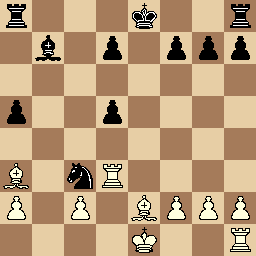
17...Nxe2!
Crowley: "Perhaps better than taking the second pawn. The two bishops are always dangerous and the pawn might have been regained with the better game." 17...Nxa2
18.Re3+ Kd8 19.Kxe2! d4
Crowley: Temporary insanity.
20.Re7
20.Rg3 Is playable for the moment, but in the long-term, the R is in an odd spot.
20...Re8
20...Bxg2 21.Rg1 At least loses black's edge by permitting counterplay.
21.Rxe8+ Kxe8 22.Kd3 f6 23.Kxd4 Kf7
23...Bxg2?! 24.Rg1 Here actually hands the advantage, and likely the game, back to white.
24.c3 Re8 25.Rb1 Bc6
Playing safe for the draw. 25...Bxg2! Will work now.
26.c4 Re2!
Crowley: "This forces the exchange of rooks, and consequently the draw. Bishops of opposite colors and pawns even can result in nothing else." 26...Bxg2 Will still work, but with a tough game against the Black Death, Crowley opts for the draw.
27.Rb2 Rxb2 28.Bxb2
Crowley: Mr. Blackburne proposed a draw which was accepted.
28...Ke6= ½-½
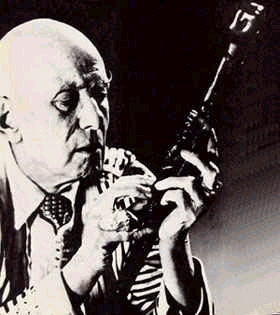
The Wanderer of the Waste during his last years,
here showing a prized magical wand.
Crowley,A - NN [B30]
1.e4 c5 2.Nf3 Nc6 3.c3 g6 4.Bc4 e6 5.d4 cxd4 6.cxd4 Bg7 7.e5 d5 8.Bb5 Qa5+ 9.Nc3 a6 10.Bxc6+ bxc6 11.Bd2 Qc7 12.Ng5 f6 13.exf6 Nxf6 14.0-0 0-0 15.Qe2 e5 16.dxe5 Ng4 17.f4 Qb6+ 18.Kh1 a5 19.Na4 Qa7 20.e6 Nf6 21.Rac1 Ba6 22.Qe5 Ng4 23.Qe1 Bxf1 24.Nc5 Bc4 25.e7 Qxc5 26.Qe6+ Kh8 27.Nf7+ Rxf7 28.Qxf7 0-1
Crowley,A - Shoosmith,H [C37]
1894
1.e4 e5 2.f4 exf4 3.Nf3 g5 4.Bc4 C37 KGA: King's knight's
gambit 4...d6 5.0-0 h6 6.d4 Ne7 7.Nc3 Bg7 8.e5 OOB 8...d5 9.Bb3 c6 10.Ne2
Ng6 11.g3 g4 12.Nxf4 Nxf4 13.Bxf4 gxf3 14.Qxf3 Be6 15.c3 Nd7 16.Bc2 Nf8
17.Qh5 Qd7 18.Bd2 Bg4 19.Qh4 Ng6 20.Bxg6 fxg6 21.e6 Bxe6 22.Rae1 g5? 23.Qg4
0-0-0 24.Rxe6 h5 25.Qe2 h4 26.Bxg5 Rdg8?? 27.Re7 Qh3 28.g4 Bxd4+ 29.cxd4
Rxg5 30.Re8+ Rxe8 31.Qxe8+ Kc7 32.Qe7+ 1-0
Notes
1. The excerpt can be found on-line at www.stonemirror.net/Pages/maugham.html
2. A Moveable Feast, by Ernest Hemingway, 1966, Penguin. Chapter 9, p. 67-8.
3. Two excellent sites for Thelema are http://www.lashtal.com/nuke/ and http://www.thelemicknights.org/acfhome.html
4. A. A good time-line for the main events of Crowley’s life is available at http://www.lashtal.com/nuke/
B. The Biography Project has a good brief intro to Crowley’s life here http://www.popsubculture.com/pop/bio_project/aleister_crowley.html
C. For the astrologically-minded, the Great Beast’s birth-chart is available here http://www.khaldea.com/charts/aliestercrowley.shtml
D. If you want a standard bio, first, let the man speak for himself: The Confessions of Aleister Crowley is available through a number of publishers and can be read on-line at http://www.hermetic.com/crowley/confessions/
E. The Great Beast, by John Symonds, 1971, Macdonald, is the first, and maybe the best, of the “second opinions”.
F. By the by, Aleister is Crowley’s reworking of Edward Alexander.
5. The Confessions, Chapter 3, p.48.
6. Ibid., Chapter 9, p. 93.
7. The EastBourne Gazette columns have recently been excavated and put into pdf form! Again, my great thanks to the people at http://www.lashtal.com/nuke/
8. The Confessions, Chapter 16, p. 140.
9. This proliferation of apocryphal Crowley games is, no doubt, something good Aleister, himself an inveterate jokester, would appreciate. That even reputable chess authorities are occasionally taken in is all the more amusing. See for example how GM Larry Evans was taken to the chessic cleaners at http://www.worldchessnetwork.com/English/chessNews/evans/031201.php (Sorry, this is just too funny. GMs should really get out more often…)
10. Crowley wrote a series of detective tales featuring the protagonist Simon Iff. The one here quoted is Big Game, included in the excellent book by Sandy Robertson The Aleister Crowley Scrapbook, 1988, Quantum. The Simon Iff tales are in print in various additions, and some may be read on-line at http://www.hermetic.com/crowley/simon-iff/.
Also, a good deal of the Crowley oeuvre may be found at http://www.hermetic.com/crowley/
“Love is the Law, Love Under Will.”
Hosted by Hermetic.com